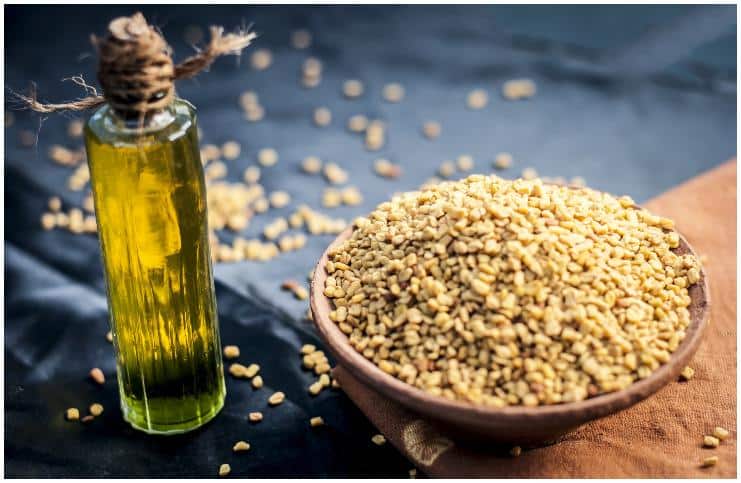Fenugreek (Trigonella foenum-graecum) is an annual herb in the family Fabaceae, similar to clover, that is native to the Mediterranean region, southern Europe, and western Asia. The plant is also known as Greek hay seed, methi seed, and bird’s foot.
It is cultivated from China to western Europe for its aromatic seeds and is still grown for fodder in parts of northern Africa and Europe. The first recorded use of the plant is described on an ancient Egyptian papyrus dated to 1500 B.C.
The ground seeds are commonly used in curry powder, dry rubs, spices blends, and tea blends.
A pinch can also be sprinkled over cooked greens or sauce. Fresh leaves can be added to cooked dishes and salads. Commercially, this herb is used in the preparation of mango chutneys and as a base for imitation of maple syrup.
Nutritional facts
These seeds have been found to contain protein, vitamin C, pyridoxine, thiamin, niacin, folic acid, iron, calcium, selenium, manganese, copper, zinc, magnesium, potassium, and diosgenin (which is a substance that has properties similar to estrogen).
In addition, they contain steroidal saponins (yamogenin, diosgenin, tigogenin, and neotigogenin).
Fenugreek seeds health benefits
Increases milk supply
Mothers who wish to build their milk supplies may consider using this herb. Mothers usually notice an increase in production 24-72 hours after starting supplementing with this herb, but it can take up to two weeks for others to see a change.
Although it’s not known why this happens, researchers speculate that the oil contained in these seeds plays an important role. Once milk flow has been strongly established, it is possible to discontinue supplementation.
In order to use this herb as a galactagogue (a substance that promotes lactation in humans), most women take the herb in capsule form a few times daily, consuming approximately 3,500 grams total daily for milk production to increase.
Increases breast size
This herb has an age-old reputation as a breast enlarger and contains diosgenin (a steroid sapogenin) which is used to make synthetic estrogen and has been shown to promote the growth of breast cells.
Improves digestive problems
Daily consumption of fenugreek seeds enhances bowel movements and is a viable cure for digestive problems. As the plant is rich in antioxidants and dietary fiber, it helps in flushing out harmful toxins from the body and aids digestion.
You can even drink a Trigonella foenum-graecum decoction early in the morning to deal with constipation.
Lowers bad cholesterol

A 1997 study, by the Department of Medicine, India, concluded that administering 2.5 grams of the supplement twice daily for 3 months to individuals dealing with non-insulin-dependent diabetes mellitus considerably lowered LDL cholesterol naturally, along with triglycerides, without affecting HDL (good) cholesterol.
Kidney Stones
These seeds may reduce the amounts of calcium oxalate in the kidneys. A 2010 study published in the journal “Human and Experimental Toxicology” established that the treatment with a 10% water extract of the herb for 60 days returned kidney function to near-normal levels.
Lowers blood sugar
The herb contains an amino acid called 4-hydroxyisoleucine, which appears to increase the body’s production of insulin when blood sugar levels are high. Hence, a recommended home remedy for treating type 2 diabetes is to consume 500mg of the supplement seed twice daily.
Cancer protection
Studies have shown that saponins and mucilage in the plant bind to toxins in the food and flush them out, thus protecting the mucous membrane of the colon against cancer.
Helps counter acid reflux or heartburn
One teaspoon of these seeds in your food can be a good remedy for heartburn or acid reflux. Mucilage from the seeds coat the lining of the stomach and intestine and soothe irritated gastrointestinal tissues.
According to a research published in the journal Phytotherapy Research, a two-week intake of this supplement taken 30 minutes before 2 meals by individuals with frequent heartburn notably diminished heartburn severity.
Libido
This plant is also considered an aphrodisiac, and numerous studies tout its capacity to increase libido in men.
Benefits for hair growth and skin care
It is an excellent natural remedy for hair care because it contains a hormone that facilitates hair growth. When applied to hair, these natural remedy makes your hair super soft and silky and reduces the dryness of the scalp.
Moreover, using these seeds mixed with coconut oil can be a good home remedy for hair fall and thinning of hair.
These seeds are also beneficial for the treatment of numerous skin conditions, such as – scars, boils, acne, burns, wounds, leg ulcers, and eczema.
In addition, they can help protect your skin from sun damage. One reason may be due to the anti-inflammatory and antioxidant properties of these amazing seeds.
Method
Soak 100g of seeds overnight in water. Then, in the morning, blend them with 100 ml of coconut oil. Use this paste to your hair, scalp, or skin. Keep it on for 30 minutes and then wash off with water.
Side effects of methi seeds
During pregnancy

This herb has been used to aid and induce labor and is considered to be an emmenagogue. The FDA generally regards the plant as safe, but should not be used by pregnant mothers.
Accordingly, the herb use is not recommended during pregnancy (especially late pregnancy).
Drugs interactions
Oral drugs or herbs are taken at the same time as the plant may have delayed absorption due to the mucilage content. People with underlying bleeding disorders or who take anticoagulants should not take this plant without their healthcare specialist’s approval.
Allergic reactions
Considering that this herb belongs to the same genus of soybeans, chickpeas or peanuts, it is not uncommon for some individuals to have allergic reactions to the herb. Usual symptoms of allergic reactions are hives, rash, breathlessness, and fainting.
Other side effects
Consuming this plant may also cause body secretions, including urine, to smell like maple syrup. This happens due to a metabolite called sotolon. Also, the plant can cause irritation when applied to the skin.
References http://www.ncbi.nlm.nih.gov/pmc/articles/PMC4291444/ http://www.ncbi.nlm.nih.gov/pubmed/9175175 http://onlinelibrary.wiley.com/doi/10.1002/ptr.2190/abstract










